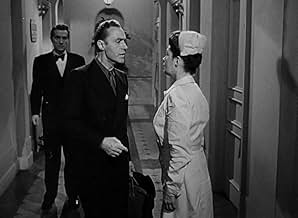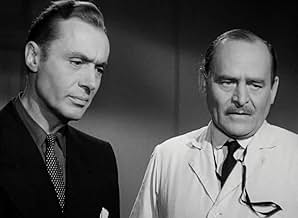AVALIAÇÃO DA IMDb
6,3/10
2,1 mil
SUA AVALIAÇÃO
Adicionar um enredo no seu idiomaIllegal refugees lead dark lives in pre-World War II Paris.Illegal refugees lead dark lives in pre-World War II Paris.Illegal refugees lead dark lives in pre-World War II Paris.
- Direção
- Roteiristas
- Artistas
- Prêmios
- 3 vitórias no total
Richard Alexander
- Gestapo Agent
- (não creditado)
Sylvia Andrew
- Milan Charwoman
- (não creditado)
Frank Arnold
- Newsboy
- (não creditado)
Jessie Arnold
- Cashier
- (não creditado)
George Balooi
- Scheherazade's Waiter
- (não creditado)
Avaliações em destaque
More people should know about this wonderful film--reading the book in advance really enhances the experience of it, but one can just enjoy the incredible performances of Bergman and Boyer (not to mention the excellent character roles, particularly Charles Laughton). The use of light/shadow is also extremely well done and atmospheric. It's high time someone re-releases this movie on DVD (Criterion, perhaps), because it's another wonderful example of classic film noir, very well executed.
For those not familiar with Remarque's novel, it's a must-read--although I warn you, after you're done you will have an insane urge to try Calvados.
For those not familiar with Remarque's novel, it's a must-read--although I warn you, after you're done you will have an insane urge to try Calvados.
Director Lewis Milestone tries - and succeeds, to some extent - to make ARCH OF TRIUMPH an interesting film. To that end, he is greatly helped by the cinematography, with beautiful chiaroscuros that heighten the oppressive atmosphere, but he is let down by a meandering script, a far cry from Remarque's original novel.
Boyer, normally a middle of the road actor, does well enough here to overshadow even the great Ingrid Bergman (they had been paired together in GASLIGHT, 1944, and she had won an Oscar for that performance). I think that happened because by this point Bergman had already met, and fallen in love with, Roberto Rosselini, and that must have distracted her no end (her character even claims to be Italian, and she speaks Italian toward the end of the film). That emotional upheaval, which was about to have serious consequences for her career, pushing her out of Hollywood for about 8 years, definitely impacted on her acting in this film, and on the latter's quality.
In the end, it is the film's dark atmosphere that stays with you - and that's not much. Still, I am glad I watched it, it is better than many supposedly politically correct movies done today.
Boyer, normally a middle of the road actor, does well enough here to overshadow even the great Ingrid Bergman (they had been paired together in GASLIGHT, 1944, and she had won an Oscar for that performance). I think that happened because by this point Bergman had already met, and fallen in love with, Roberto Rosselini, and that must have distracted her no end (her character even claims to be Italian, and she speaks Italian toward the end of the film). That emotional upheaval, which was about to have serious consequences for her career, pushing her out of Hollywood for about 8 years, definitely impacted on her acting in this film, and on the latter's quality.
In the end, it is the film's dark atmosphere that stays with you - and that's not much. Still, I am glad I watched it, it is better than many supposedly politically correct movies done today.
Paris, whether real or imagined, has rarely looked so spiritually and atmospherically gloomy on screen as it does in this underrated wartime romantic drama by Lewis Milestone. While the stark chiaroscuro black-and-white cinematography of the venerable Russell Metty certainly plays a hand in painting a bleak portrait of the refugee-laden French capital of the late 1930s, these conditions in the film are also derived from the fact that a good portion of it unfolds during many a rainy night. And it's under such circumstances that our protagonists—the hard-bitten, oft-deported Dr. Ravić (Charles Boyer), a victim of the Nazi regime when he was a member of the Austrian underground, and Joan Madou (Ingrid Bergman), a dispirited Italian-born cabaret singer—meet and eventually fall in love. However, this is neither the cutesy nor the heedless kind of love so often seen in lesser films. It is, rather, of the sort that takes place between two complex, multifaceted individuals who are world-weary, are aware of their strengths and weaknesses, and, most importantly in this case, know that they have little to no control over their impending future. Needless to say, both actors, who earlier worked together in George Cukor's Gaslight (1944), come through with strong, authentic performances; Bergman, especially, as her character grows the most and requires her to depict various shades. To its credit, the film's low-key, matter-of-fact approach isn't merely relegated to the love story; its political intelligence is equally sober and attentive. And the same could be said for Milestone's direction—he does not get many opportunities here to showcase his trademark camera movements. Adapted from a novel by German author Erich Maria Remarque, who also provided the source for Milestone's antiwar classic All Quiet on the Western Front (1930), this rich and engrossing film may have been ignored in its day but is bound to emerge triumphant sooner or later.
This could have been a much better movie. Boyer's disenchanted, vengeful refugee doctor is excellent and Bergman's Joan, unable to commit or disengage, could have been a fascinating characterisation. But while individual scenes are very fine, the film, as a whole, is oddly disconnected, suggesting ruthless cutting. The sub-plot involving Laughton's porcine Gestapo bully is perfunctory and we get far too much of Calhern's emigre. Still, the black and white photography is impressive, and I rather went for the doom and gloom!
Not sure about this one. There's much to like; the atmosphere, the camera work, the lighting and shadows, the closeups, the acting. But something's missing, perhaps continuity, or the impression that it all somehow fits together. Taken as a series of vignettes this film is very good. Combine the vignettes to tell a subset of the original story and it could be even better. But put it all together and it succumbs under the sheer weight of all the subplots.
And yet, despite my criticism, I am pleased to have seen it. As I said there's much to like, especially the acting. Louis Calhern is always a joy and here he lends a nuanced gravitas to his part. Charles Boyer is better than usual playing a tormented refugee torn between love and revenge. Charles Laughton is the pivot about which the story revolves and without him his one dimensional character would have been but a caricature. There's even a memorable cameo by an uncredited William Conrad. His scene is no more than a minute or so but it's not one you're likely to overlook or forget. But the best reason to watch it is of course Ingrid Bergman. Her effortless ability to switch personalities simply draws you in to her performance. Here she plays an insecure wreck, an incredibly seductive, infuriatingly deceitful and mostly terrified woman. Her character's choices are not perhaps entirely honorable but with Bergman who cares...
And yet, despite my criticism, I am pleased to have seen it. As I said there's much to like, especially the acting. Louis Calhern is always a joy and here he lends a nuanced gravitas to his part. Charles Boyer is better than usual playing a tormented refugee torn between love and revenge. Charles Laughton is the pivot about which the story revolves and without him his one dimensional character would have been but a caricature. There's even a memorable cameo by an uncredited William Conrad. His scene is no more than a minute or so but it's not one you're likely to overlook or forget. But the best reason to watch it is of course Ingrid Bergman. Her effortless ability to switch personalities simply draws you in to her performance. Here she plays an insecure wreck, an incredibly seductive, infuriatingly deceitful and mostly terrified woman. Her character's choices are not perhaps entirely honorable but with Bergman who cares...
Você sabia?
- CuriosidadesThe rough cut of the film ran four hours. In reducing it to two hours, several actors were cut, including Ruth Warrick. She does appear briefly in the restored 133-minute version.
- Erros de gravaçãoWhen Ravic takes his gun and goes to look for Haake in the streets, the first shot of him has been reversed for some reason as evidenced by the signs he passes, which are backwards.
- Citações
Joan Madou: He wanted to kill me. They always talk about it but they never do.
[laughs]
Joan Madou: You wouldn't want to kill me.
- ConexõesFeatured in Legendy mirovogo kino: Charles Boyer
- Trilhas sonorasLong After Tonight
(1948) (uncredited)
Music by Rudolph Polk
Music by adapted from the Russian folk song "Prochlada"
Lyrics by Ervin Drake and Jimmy Shirl
Sung by an uncredited singer dubbing Ingrid Bergman at the Scheherazade casino
Principais escolhas
Faça login para avaliar e ver a lista de recomendações personalizadas
- How long is Arch of Triumph?Fornecido pela Alexa
Detalhes
- Data de lançamento
- País de origem
- Idiomas
- Também conhecido como
- O Arco do Triunfo
- Locações de filme
- Empresas de produção
- Consulte mais créditos da empresa na IMDbPro
Bilheteria
- Orçamento
- US$ 5.000.000 (estimativa)
- Tempo de duração
- 2 h(120 min)
- Cor
- Proporção
- 1.37 : 1
Contribua para esta página
Sugerir uma alteração ou adicionar conteúdo ausente


































